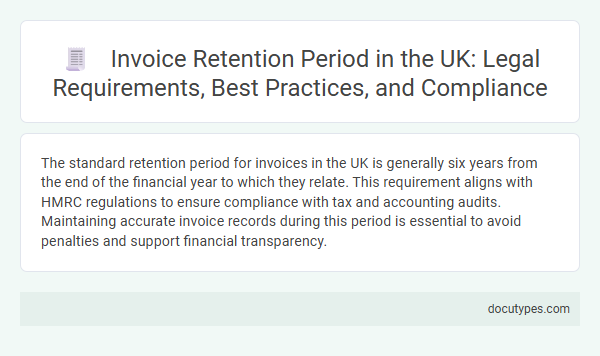The standard retention period for invoices in the UK is generally six years from the end of the financial year to which they relate. This requirement aligns with HMRC regulations to ensure compliance with tax and accounting audits. Maintaining accurate invoice records during this period is essential to avoid penalties and support financial transparency.
Introduction to Invoice Retention in the UK
In the UK, invoices are essential documents for financial record-keeping and tax purposes. The standard retention period for invoices is typically six years, as mandated by HM Revenue & Customs (HMRC). Your business must securely store these records to comply with legal requirements and support potential audits.
Legal Requirements for Invoice Retention
The standard retention period for invoices in the UK is typically six years. This timeframe meets the legal requirements set by HM Revenue and Customs (HMRC) for tax and accounting purposes.
- Legal Mandate - UK law requires businesses to keep invoices for at least six years to comply with tax regulations.
- HMRC Compliance - HM Revenue and Customs mandates retaining invoices to ensure accurate financial reporting and auditing.
- Business Records - You must securely store your invoices for six years to meet statutory record-keeping obligations and support potential investigations.
Statutory Retention Periods for Invoices
The standard retention period for invoices in the UK is dictated by statutory requirements to ensure compliance with tax and business regulations. Maintaining accurate records during this timeframe is essential for both financial auditing and legal purposes.
- Statutory Retention Period - Invoices must be kept for a minimum of six years from the end of the financial year to comply with HMRC regulations.
- Tax and Audit Compliance - Retaining invoices within the statutory period supports accurate VAT returns and allows for potential tax inspections.
- Business Record Keeping - Proper invoice retention protects your business from disputes and provides evidence in case of financial reviews or legal claims.
You should ensure invoices are securely stored and accessible for at least six years to meet UK legal requirements.
VAT Invoices: Specific Retention Rules
Understanding the standard retention period for invoices is crucial for compliance with UK tax regulations. VAT invoices require specific retention rules to ensure proper record-keeping and auditing.
- Standard Retention Period - In the UK, invoices should be retained for a minimum of six years from the end of the last company financial year they relate to.
- VAT Invoice Requirements - VAT invoices must be kept for six years to comply with HM Revenue & Customs (HMRC) regulations regarding input tax claims and audits.
- Your Responsibility - You must ensure VAT invoices are stored securely for the required period to avoid penalties and support accurate VAT reporting.
HMRC Guidelines for Document Retention
The standard retention period for invoices in the UK is typically six years. This duration aligns with HMRC guidelines for document retention to ensure compliance with tax regulations.
HMRC requires businesses to keep invoices for six years from the end of the last company financial year they relate to. You must retain these records to support any tax returns and avoid potential penalties.
Electronic vs Paper Invoices: Compliance Considerations
In the UK, the standard retention period for invoices is typically six years for both electronic and paper formats. This duration aligns with HMRC requirements for tax and accounting purposes.
Electronic invoices must be stored in a secure, accessible format to ensure compliance with VAT regulations. Paper invoices require physical storage in conditions that prevent damage or loss. You should maintain these records for the full retention period to avoid penalties and ensure audit readiness.
Best Practices for Managing Invoice Records
The standard retention period for invoices in the UK is generally six years, as mandated by HM Revenue and Customs (HMRC) for tax and accounting purposes. Best practices for managing invoice records include organizing documents chronologically, using digital storage solutions for easy retrieval, and ensuring data security to protect sensitive financial information. You should regularly review and update your invoice management system to comply with legal requirements and streamline your financial auditing process.
Common Mistakes in Invoice Retention
| Topic | Details |
|---|---|
| Standard Retention Period for Invoices in the UK | HMRC requires businesses to retain invoices and financial records for a minimum of 6 years from the end of the last company financial year they relate to. This period ensures compliance with tax regulations and supports potential audits. |
| Common Mistakes in Invoice Retention |
|
Consequences of Non-Compliance
The standard retention period for invoices in the UK is typically six years. This requirement is mandated by HM Revenue & Customs to ensure proper tax record-keeping.
Failure to retain invoices for the required period can lead to penalties and fines from tax authorities. You risk complications during audits, which may result in disallowed expenses and additional tax liabilities.
What Is the Standard Retention Period for Invoices in the UK? Infographic

